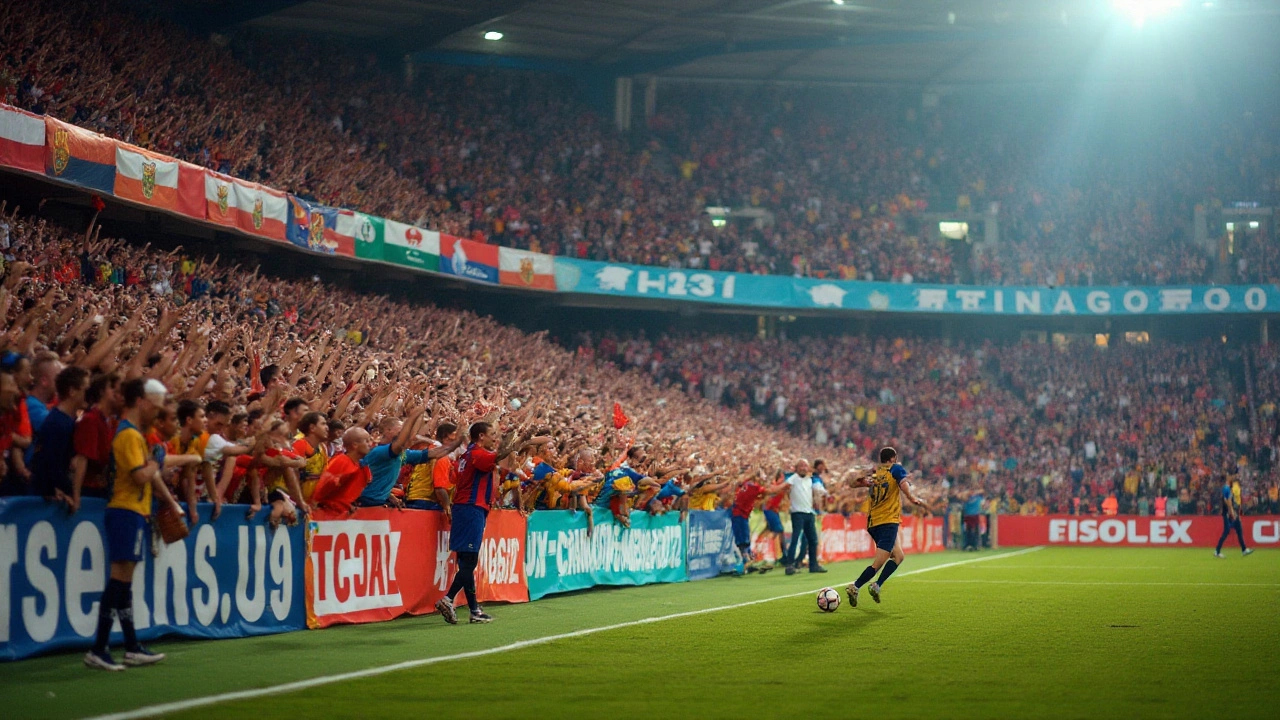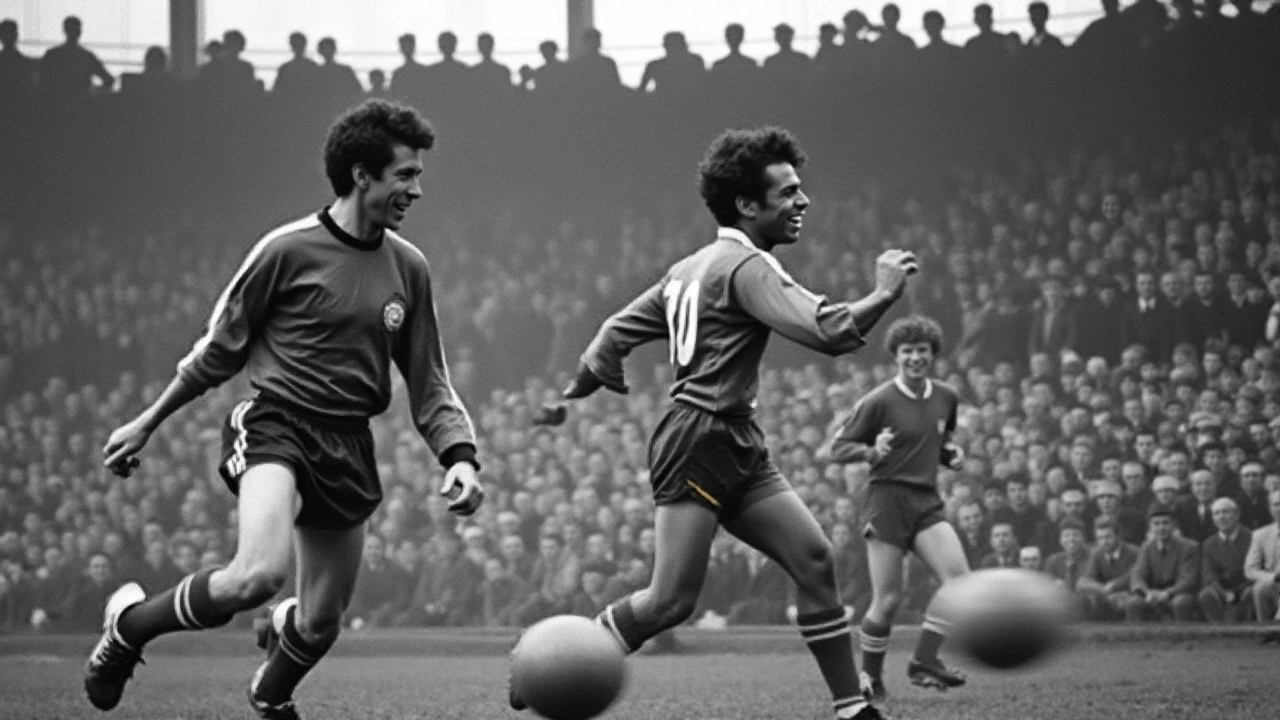Defining Football: A Single Word and What It Embodies

What can truly capture the heart of football in just one word? It's a challenge to put this global phenomenon into a single encapsulating term. But for millions, a single word stirs images of cheering crowds, stunning goals, and nail-biting finishes.
Football, known as soccer to some, is more than just a game played between two teams striving to score goals. It's a vibrant tapestry of culture, community spirit, and the shared heartbeat of nations.
Around the world, from the bustling streets of Rio to the local pitches in Bristol, football is a universal language spoken in joyous cheers and collective hopes.
Yet, beyond the matches and the scores, it is the essence of football that hooks the hearts of many. That very essence, perhaps encapsulated in a single powerful word, pulses with the energy of something extraordinary.
- Defining the Essence of Football
- The Global Love for the Game
- Football's Memorable Moments
- Community and Connectivity
- Tips to Deepen Your Football Experience
Defining the Essence of Football
Attempting to define the essence of football is akin to describing an age-old melody that resonates differently with each listener. There is an intangible quality to the sport, an energy that transcends beyond the boundary lines of the pitch. Many argue that it’s the simplicity of the game that draws people in—a universal sport accessible to everyone, irrespective of age, gender, or status. Catch a glimpse of a match from any corner of the world, and it's likely to stir emotions of unity and shared euphoria. The integrity of football lies in its unpredictability and raw drama, with each game unfolding like a theatrical masterpiece.
Historically, football finds its place in ancient civilizations. Traces of a similar game can be discovered in ancient China under the name of Cuju, endorsed by the Han dynasty as a form of military training. Fast forward to the mid-19th century in England, the modern form of football began taking shape in schools across the country, carving the path for organized sporting culture. Its growth has been exponential, feeding on the passion of nations and imprinting indelible moments in history. Current FIFA statistics illustrate a staggering number of participants and viewers, with billions watching events like the World Cup, proving its mass appeal and its deeply rooted significance in communal identities.
“Some people think football is a matter of life and death. I assure you, it's much more serious than that.” – Bill Shankly
The electrifying connection between players and spectators generates a singular vibrance found only in this arena. It celebrates diversity and inclusivity, providing a platform where backgrounds dissolve, leaving just the love of the game itself. Yet what truly defines football may be the silent, profound communion of those who witness and partake. A match might only last ninety minutes, but the game lives on in stories told, friendships forged, and rivalries forever etched in history books. It compels us, commanding attention and devotion, much like the steadfast loyalty of lifelong fans.
Ultimately, attributing one word to articulate the complex essence of football is a personal journey. For some, it might be 'passion,' for others, 'joy' or even 'unity.' The magic lies in its capacity to mean something special and unique to each individual. As you observe a match, whether from the roaring stands of Old Trafford or a quiet evening in your local pub, that essence is palpable. It is the unspoken bond between two strangers celebrating the same goal—the sense of belonging to a larger narrative that is simply, wonderfully, football.
The Global Love for the Game
Football, often called the beautiful game, holds a special place in the hearts of millions, standing as a beacon of unity and joy. Its ability to transcend language and cultural barriers is perhaps unmatched by any other sport. From the favelas of Brazil to the bustling streets of Tokyo, the game resonates with an unparalleled passion. In cities, towns, and villages across the world, children grow up dreaming of donning the jersey of their favorite team, their eyes filled with dreams of scoring the winning goal in a grand stadium.
Perhaps it is the simplicity of football that underpins its universal appeal. All it takes is a ball and a couple of makeshift goals to set the stage for a game. The accessibility of football ensures that children everywhere can partake, regardless of their economic background. This is a sport where improvisation thrives, and creativity permeates every facet of play. In many countries, football fields are more than just physical spaces; they are the heart of the community, where friendships are forged and life lessons are imparted.
The fervor for football is typified by iconic events such as the World Cup, where the eyes of the world turn to watch 32 nations vie for glory. The tournament is more than just a competition; it's a celebration of culture, camaraderie, and the shared love for a game that binds us. Thousands of fans converge, draped in their national colors, voices raised in jubilant song. The electric atmosphere of these matches—whether in 90-minute showdowns or penalty shootouts—is palpable, leaving an indelible mark on those fortunate enough to witness it live.
As Pelé, one of the game's greatest icons, once said:
"Football is a unique game that has attracted 190 nations and hundreds of millions of people to play. Football is the best form of communication among all people."His words underscore the role of football as a universal language that speaks to a shared human experience, bridging gaps and knitting communities together. Such is the magic of football that it turns strangers into companions in the stands of a stadium or in the comfort of living rooms across the globe.
The sheer scale of football's following is evident in staggering statistics. According to FIFA, the 2018 World Cup was watched by over 3.5 billion people around the world. Such numbers illustrate not just a sports event but a global gathering, a shared experience that crosses all conceivable divides.
Football fosters an intense loyalty among fans, a cherished identity linked to their favorite club or national team. The chants of supporters, echoing from the steep terraces of Anfield to the vibrant stands of La Bombonera, are both a source of motivation for players and a testament to the passion of the spectators. It creates an environment where tears of joy and heartbreak are commonplace, shared emotions felt by those with skin in the game, regardless of the distance separating them physically.
In the tapestry of human experience, soccer stands as a shining thread, illuminating the commonalities amid the diversity of our global society. It is a vital cultural export, a source of pride, and a magnet drawing people together in fields and stadiums under sun and floodlights alike. The love for this game extends beyond mere competition, nurturing a global family bound by a shared adoration for the thrills, strategies, and stories that play out with each 90-minute match.

Football's Memorable Moments
From thrilling last-minute goals to awe-inspiring displays of sportsmanship, the history of football is filled with extraordinary moments that have captivated hearts across the globe. Perhaps one of the most talked-about moments occurred during the 1986 World Cup in Mexico, when Argentina's Diego Maradona scored not one but two legendary goals against England in the quarter-finals. The iconic ‘Hand of God’ goal, which Maradona cheekily described as “a little with the head of Maradona and a little with the hand of God,” stirred controversy and etched itself into history books. Then, just moments later, Maradona demonstrated sheer brilliance with a dazzling run past a phalanx of English defenders to score what would become known as the ‘Goal of the Century.’ These moments not only highlighted the skill and cunning of a single player but also showed the complexity and unpredictable nature that makes football so thrilling.
Another unforgettable moment came during the 1999 UEFA Champions League final between Manchester United and Bayern Munich. A seemingly hopeless situation for the Red Devils, where they trailed 1-0 with injury time looming, transformed into a spectacular comeback. In the dying moments, two quick goals, from Teddy Sheringham and Ole Gunnar Solskjaer, turned despair into ecstasy and secured their treble-winning season. The match epitomized the never-say-die spirit of football and the heart-pounding excitement it offers to its viewers. Moments like these are why fans keep coming back, knowing that until the final whistle blows, anything is possible. A quote from Sir Alex Ferguson captures this essence perfectly:
“Football, bloody hell.”
Stunning achievements are not just limited to the field of play; they extend into the realm of record-breaking feats. Pelé’s rare achievement of scoring over a thousand career goals serves as a testament to his skill, longevity, and prominent status in the world of football. Likewise, Lionel Messi's incredible records, like breaking Gerd Müller’s record for most goals in a calendar year, continue to astonish fans. It’s these records that drive young dreamers to pick up a ball, imagining themselves breaking barriers, and perhaps, one day, executing a moment that will forever be lodged in the collective memory of sports enthusiasts.
While it’s easy to focus on the legendary players and their historic goals, football also offers moments of heartwarming humanity and unity. Who can forget the awe-inspiring scenes when the war-torn nation of Iraq triumphed in the 2007 AFC Asian Cup? Their victory symbolized hope, demonstrating the sport’s incredible ability to unite people even amidst turmoil. Similarly, the countless times teams have locked arms in solidarity for social causes reminds us that football is not just a game—it’s a powerful platform for change. Through inspiring stories and heart-stopping matches, memorable moments in football consistently remind us why the sport is cherished worldwide.
Community and Connectivity
Football, often referred to as the beautiful game, possesses the magical ability to unite people across borders and cultures. From local clubs to international leagues, it fosters a sense of belonging and togetherness that few other sports can achieve. This communal spirit is evident in the diverse makeup of fan bases, which include people from various ethnic backgrounds, age groups, and walks of life. Whether you're in the stands wearing your team's colours or at home watching with family, it's the shared emotion and dedication that bind football enthusiasts into a vast global community.
The power of football to connect communities is perhaps best exemplified during major tournaments like the FIFA World Cup. During these events, entire nations pause to watch, cheer, and even shed tears over a game. Streets, pubs, and public squares come alive with the sounds of chants and celebrations, transforming them into vibrant hubs of human connectivity, as neighbours and strangers alike find common ground in a mutual passion. This sense of unity extends beyond geographical and political barriers, creating a world where people who might never meet are brought together by a love for the game.
Moreover, football has played pivotal roles in bridging social divides and promoting peace. One notable example is the 'Football For Friendship' program, which has successfully used the sport to foster relationships between children from different countries and cultures. Such initiatives underline the sport's role in shaping societies by breaking down prejudices and encouraging dialogue and understanding. As Nelson Mandela once remarked, football has the power to inspire and unite people in a way that little else can."Football is not just a game. It is a multibillion-dollar industry that has an unrivaled ability to inspire, motivate, and unite us," said Sepp Blatter, former FIFA president.
The advent of social media has only intensified the communal aspect of football. Online platforms allow fans to engage in discussions, share their opinions, and express their support from anywhere in the world. Hashtags unite fans virtually under club affiliations, while digital fan groups and forums become places to connect over shared victories and losses. As digital life becomes intertwined with everyday experiences, the connectivity of football breaks traditional boundaries, pushing the reach of the game into new dimensions and creating a twelve-month-a-year community.
Yet, for all the technological advancements, the core of football's community spirit resides in grassroots clubs. These local clubs serve as the lifeblood of the sport, allowing budding players to hone their skills and giving fans weekly doses of the game they love. It's here, in community centers and parks, that many people's passion for football is ignited and nurtured. Such clubs often become a focal point of community life, offering much-needed social support networks and promoting physical health. Their impact goes beyond sports, contributing positively to community development and local identities.
In essence, the connectivity football offers extends beyond social gatherings or meme-worthy moments online. It builds bonds that last a lifetime, helps people navigate through cultural differences, and in extraordinary instances, acts as a catalyst for global understanding. Football isn't just a game; it's a universal connector and a microcosm of our world with the world itself reduced to a pitch.

Tips to Deepen Your Football Experience
For those passionate about football, diving deeper into the world of the sport can be as enthralling as the game itself. Although watching a match might be the highlight, there are numerous ways to enrich your understanding and foster a closer connection to the game. Start by attending live matches whenever possible. Nothing compares to the electrifying atmosphere of a live stadium, where every cheer and gasp reverberates through the air, creating a shared rhythm with fellow fans. Even local club matches can provide an intimate glimpse into the undying spirit that fuels this sport.
Engaging with the history of football can also enhance your appreciation of today's matches. Knowing the legendary players and historic games adds layers of narratives to current play-offs. Icons like Pele, Diego Maradona, and more recently, Lionel Messi and Cristiano Ronaldo, have left indelible marks on the game. Reading about their lives and careers offers insight into their dedication and what makes their skills timeless. Consider exploring documentaries or reading autobiographies of your favorite players to see their journeys beyond the field.
"Football is the ballet of the masses." - Dmitri Shostakovich
Getting involved actively with a local football club can be another exciting way to connect with the sport. Volunteering or participating in amateur football leagues can provide unmatched insights into the game's mechanics and camaraderie. Regular practice not only improves your skills but also enriches your understanding of strategies and play techniques. Alternatively, social media platforms have vast communities discussing tactics, player form, and upcoming fixtures. Engaging in these conversations can expose you to diverse opinions and enhance your analytical skills regarding the game.
For those curious about tactical aspects, studying game tactics could be thrilling. Football is a complex game with intricate formations and strategies. Learning about different formations such as 4-4-2, 3-5-2, or the modern 4-2-3-1 can illuminate how teams work to gain the advantage. Many online platforms offer tactical analysis through blogs and videos, breaking down each game, move by move. Understanding these elements can make watching a match a more nuanced and rewarding experience.Football statistics are another area rich with data that offers insights into player performances and team efficiencies. Websites provide comprehensive stats, like possession percentages and pass completion rates, which can deepen your understanding. For instance, studies show that teams with higher possession percentages tend to dominate more but translating possession into goals is key.
| Team | Possession (%) | Goals Scored |
|---|---|---|
| Team A | 65 | 2 |
| Team B | 35 | 3 |
